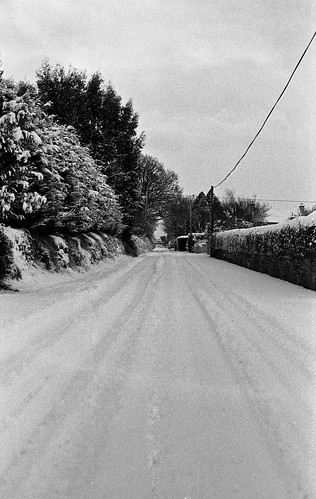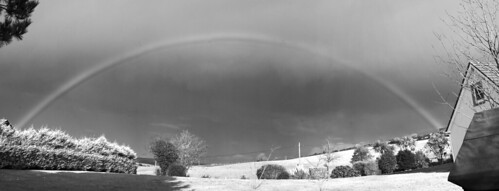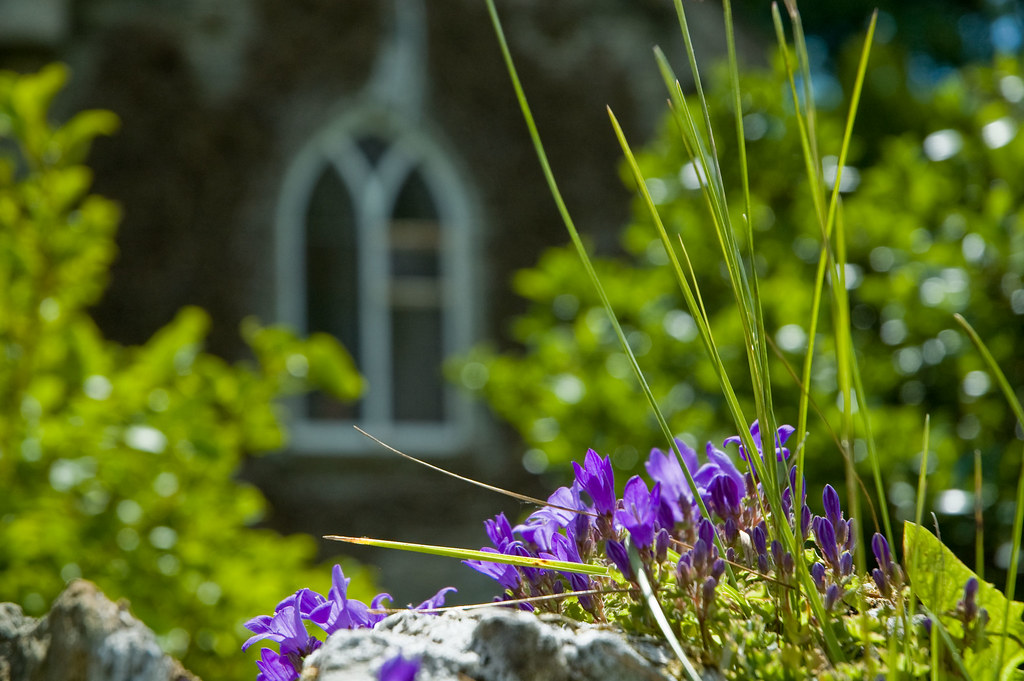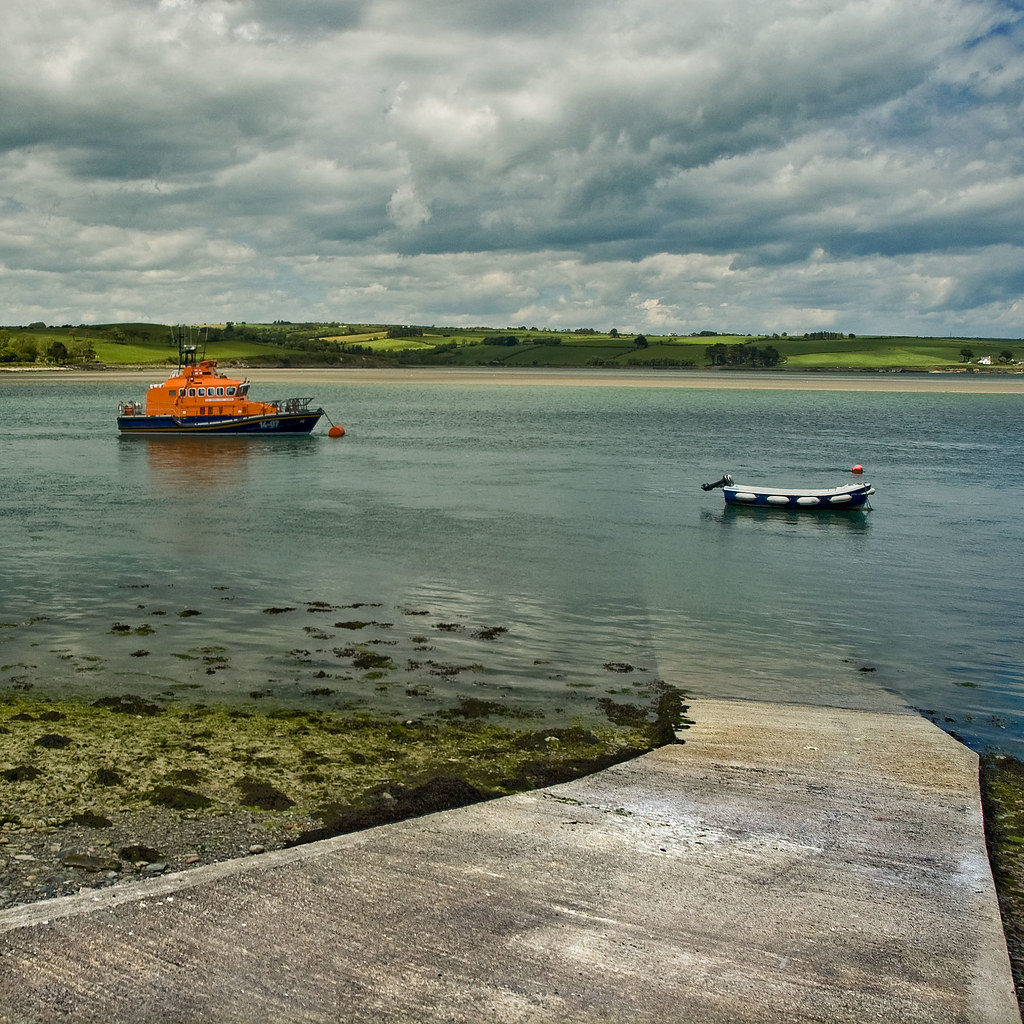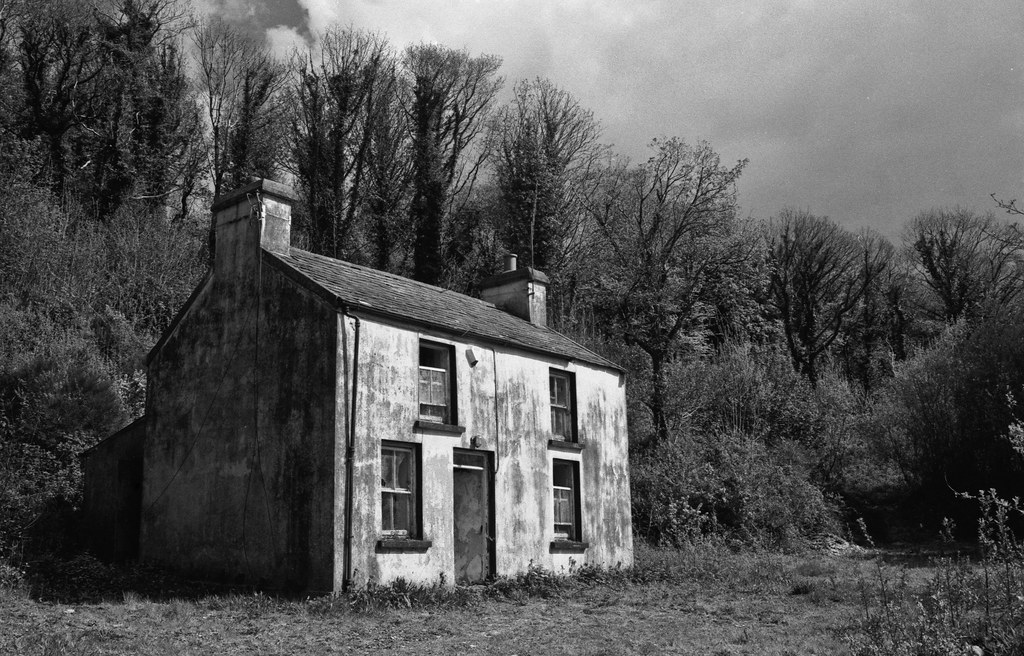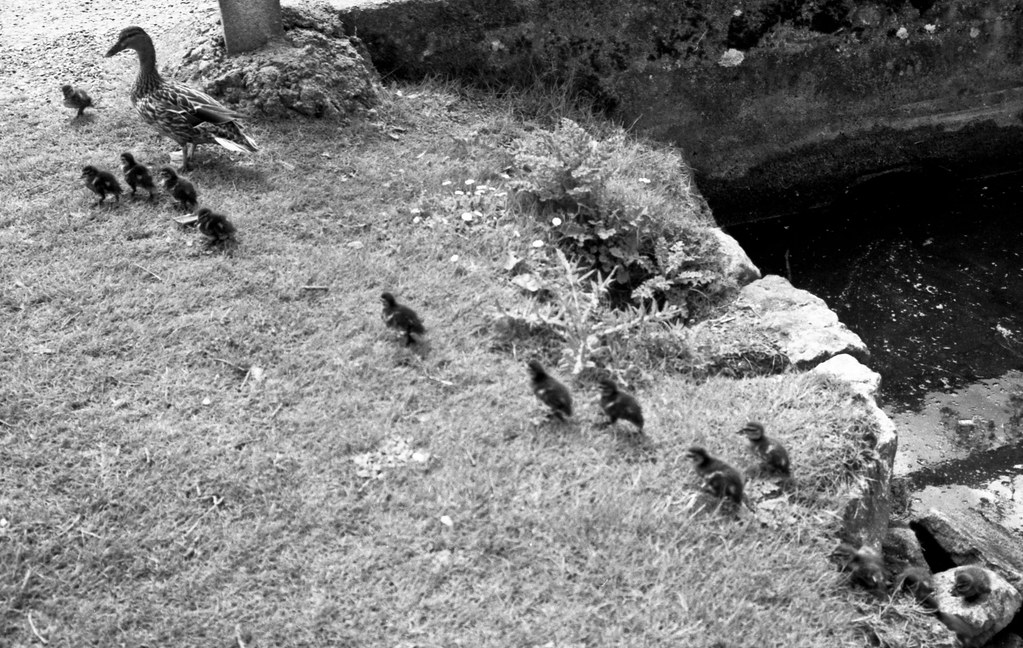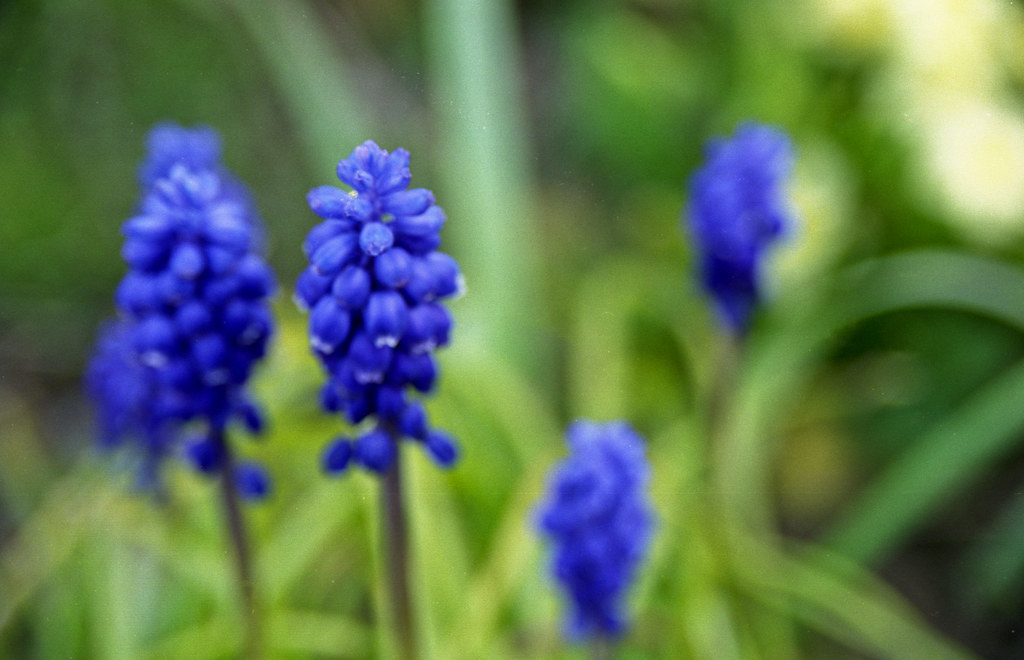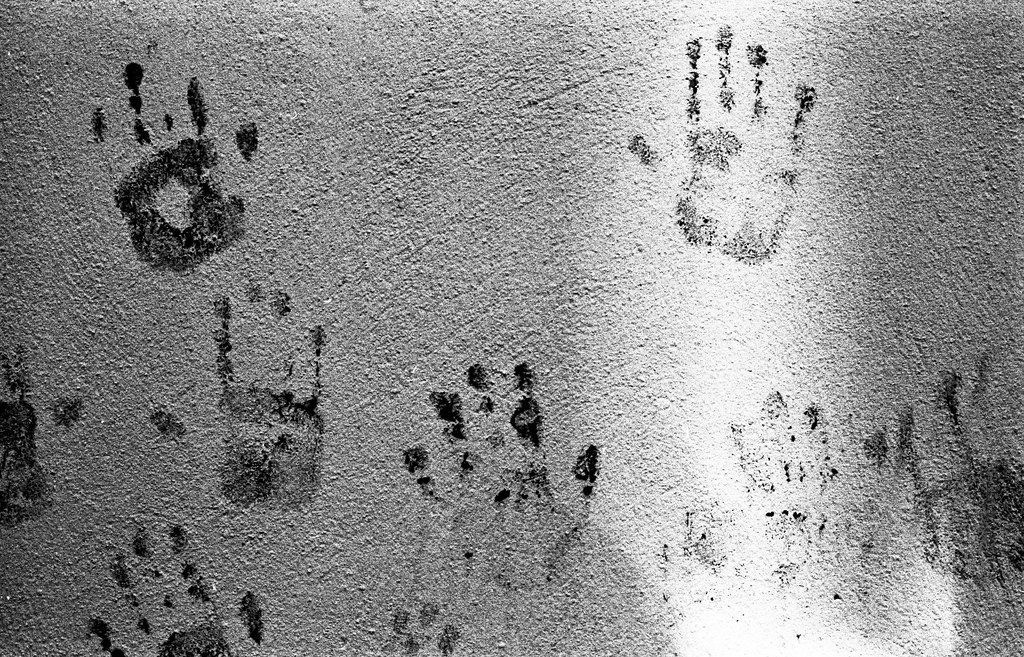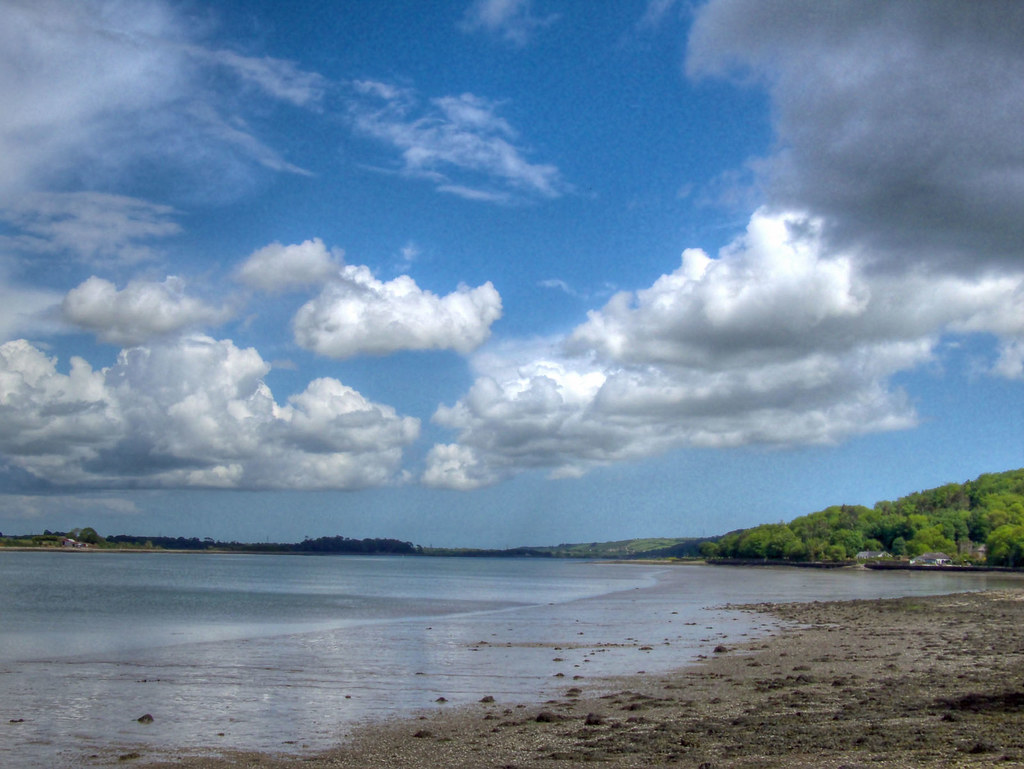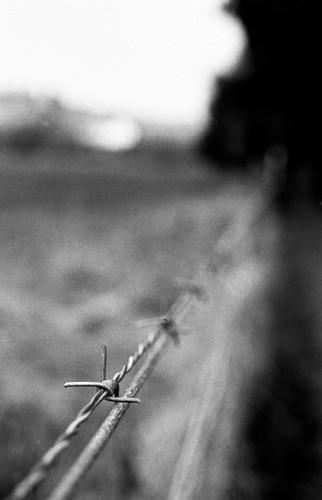Showing posts with label Jesus. Show all posts
Showing posts with label Jesus. Show all posts
Sunday, December 5, 2010
JtheB and the road to the Lord
Thank you so much to the person (who wishes to remain anonymous) who posted me a Facebook message answering my call for help. The message picked me up and got me writing again - thank you!
Today's Sermon (Text: Matthew 3:1-12) Advent 2, Year A
In his poem “St. John the Baptist's Day”, John Keble writes:
Where is the lore the Baptist taught,
The soul unswerving and the fearless tongue?
The much-enduring wisdom, sought
By lonely prayer the haunted rocks among?
Who counts it gain
His light should wane,
So the whole world to Jesus throng?(1)
The Lord Jesus said of John:
Truly I tell you, among those born of women no one has arisen greater than John the Baptist... (Matthew 11:11a)
John the Baptist was an amazing character. He lived in the desert wilderness, and Matthew tells us that he had raggedy old clothes made from camel’s hair, held up by an old leather belt. For his food / Bush Tucker Trial, he had a strict diet of locusts and wild honey. The honey sounds nice, but I’m not so sure about the locusts! He doesn’t really sound like the type of character one would normally listen to, does he? But what an awesome character John was, so holy and so humble, never seeking any credit for himself and always directing attention away from himself and onto Christ.
When I was at theological college, a Rector who I did a parish placement with discussed John the Baptist with me as I was preparing to write a sermon for that Sunday. He told me about a sermon he did on John the Baptist when he was a Curate at a well-to-do parish in Dublin. Unbeknown to the very proper elderly ladies sitting a couple of pews back from the front, a friend of his had been hiding behind the Communion Table from before the start of the service. This friend was dressed as near as possible to what John the Baptist would have looked like; he was all messy and dressed in old rags, looking like he had wandered in from the nearest desert. Right in the middle of the sermon at the pre-selected point of time, he jumped out and shouted at the top of his voice “Repent, Repent, for the kingdom of heaven is near”. I'm told that the old ladies had such a shock that the preacher feared for their health. It took much apologising from both rector and curate to smooth things over afterwards!
You'll be pleased to know that there are no hidden John the Baptists here this morning, behind the Communion Table or anywhere else!
Matthew tells us that John the Baptist came preaching in the desert. Here was a man who had given his life to God, and now God had a very important job for him to do. Firstly, he had to awaken the people to see their need to be converted and secondly he was going to introduce them to the Messiah, who would make it possible for the people to be converted.
If any of you have ever been to see a famous band or act such as U2, Lady Gaga or the Munster Ramblers :-/ perform, they will usually have what is known as a “support band”. This is a kind of “warm-up” act, to get everyone in the mood for the main performance. Usually however, people tend to ignore the support band and not bother coming out of the bar until the main performance starts. John is a bit like the warm-up act, though his job is infinitely more important. Perhaps a better example is whenever a head of state, such as a King or Queen does something important, they may be announced with a fanfare of trumpets, the red carpet will be rolled out, and people will have spent time beforehand making sure that everything is ready for the important person to arrive. This is exactly what John the Baptist is doing for the immanent arrival of the Lord Jesus and the beginning of Jesus’ ministry. John is blowing Jesus’ trumpet and he’s laying out the red carpet to prepare the way for the coming Messiah.
So John went into the countryside all around the River Jordan and he preached a baptism of repentance for the forgiveness of sins. The word Repent in Greek is μετάνοία (metanoia), It means 'to change one's mind for the better, knowing that you have offended someone (in this case God) and to look with abhorrence on your past sins' (Thayer's Greek-English Lexicon). Of course, repentance then is not just once off, it must be the way of life for the Christian. Every day in prayer and through reading God's word we allow Him to work in us to align us to His will, to His plan and purpose for our lives and to repent of our old way of living.
Baptism was nothing new. The Jewish people had for a long time performed a ceremonial washing of Gentiles who had converted to Judaism. The idea being that Gentiles were unclean and they needed to be washed before they could become one of God’s people. But here John is having the cheek to tell the Jewish people themselves that they needed to be washed, they too were unclean! But he’s saying to them, “Yes, you are unclean, but you can be forgiven, your sins can be washed away.” His audience would have been well aware of some wonderful verses in the Hebrew Scriptures that tell us about God’s forgiveness, for example:
As far as the east is from the west, so far has he removed our transgressions from us. (Psalm 103:12)
You will again have compassion on us; you will tread our sins underfoot and hurl all our iniquities into the depths of the sea.
(Micah 7:19)
A family member told me about a dream they had once, where they were looking out to sea. The tide was out and in the mud there was lots of junk, you know the sort of thing, old shopping trolleys, washing machines and so on. The person understood these to represent all the junk in their life, in other words, all the sin. But then the tide turned, the sea came in and completely covered over all the junk. This represented what God does with our sins when we say “sorry” to Him. Even more than that, because in the dream the junk was still there under the surface – but God does much more than that, He removes our sin completely.
In other words, when God forgives, He sends our sins away to a place from which they can never be brought back. When we forgive someone, we might occasionally remind them of the bad thing that they did to us, thereby showing that we haven’t totally forgiven them at all. But God doesn’t do that. He doesn’t remind us of our sins, He completely wipes them out, so that they are no more, literally, as far as the east is from the west, or as if they had been cast into the depths of the sea.
Quoting from Isaiah, John says that there will be:
A voice of one calling in the desert, ‘Prepare the way for the Lord, make his paths straight …’ The voice in the desert is of course John himself, but what does he mean when he says about making straight paths for the Lord? Perhaps that his audience should provide the Lord with ready access to their hearts and lives. May we let God’s access to us not be a windy narrow West Cork Boreen full of pot holes, but a highway where we openly welcome Him into our hearts and lives.
Later on, the Lord Jesus was to declare that John was in fact the most important of all the prophets. But even he is only a forerunner, he is only the one to announce the arrival of the coming King, the Lord Jesus Christ, the Messiah, the Lamb of God and Saviour of the world.
John welcomed the King himself, and many people who heard John’s message also welcomed Jesus as their Lord and Saviour. Let’s ask ourselves, how straight the paths are between us and God; are there obstacles in the way? Let’s be encouraged by John’s message. Let us allow ourselves to be converted, to repent, to walk in the direction of God’s will for our lives. If we’ve done this already, let’s keep going, and let us allow God by His grace to remove every obstacle in our lives that prevents us from having an increasingly full relationship with Him. Let us pray:
Lord God, you know our lives so completely, you know my life. You know the obstacles, all the pit falls, all that hinders my relationship with you. Lord there are things I try to hide, things that I am ashamed of, things I avoid; words I should say and words I shouldn't, things I should do and things I shouldn't … I give this all to you now and I say 'sorry' with all my heart. Help me Lord, help me every day to follow you, every day and every moment of my life now and into eternity. For the glory of Your Name. Amen.
--------------------------------------------------------
(1) http://yimcatholic.blogspot.com/2010/06/poem-on-st-john-baptists-day.html
Labels:
50mm,
Advent,
baptism,
Clonakilty,
forgiveness,
Grace,
Gullanes,
Jesus,
John the Baptist,
Kodak,
Nikon F100,
Repentance,
Rodinal,
Tri-x
Sunday, November 28, 2010
In the days of Noah.
Today's Sermon. Text Matthew 24:36-44
When I was a boy, I was fortunate enough to go with my parents on a holiday to Italy. My favourite part was when we visited the ancient city of Pompeii. This city in Roman times was full of life and home to 18,000 people. They were just living their lives when, out of the blue, there was an enormous volcanic eruption which rained down hot ash on the city. Many managed to escape, but 2000 people didn’t, they were buried alive. Today you can walk through the city streets and see ancient shop signs, houses, and theatres and it’s not hard to imagine that the people there had no idea when they woke up that morning on August 24th AD 79 that it would be their last day on earth.
The second coming seems all a bit like something from a Hollywood movie, something fantastic and theatrical. I think it's one of those times when the Bible uses metaphorical (or picture) language to convey to us what it will be like.
The most important thing about chapter 24 in Mathew's Gospel is to remember that it is primarily about the end of the world’s history. History is in a real sense “His Story”. The Kingdom of God came with Jesus’ Incarnation; when He lived among us. The Lord’s disciples, both then and now are citizens of two countries; we belong to this age and in the age to come. As Micheal Green puts it “”We are not what we were, but equally, we are not yet what we shall be”(1). History is steadily moving to the day when God’s Kingdom will be “Consummated”, that is achieved and fully realised. Jesus’ return will settle forever the destiny of all people. There will be no sitting on the fence, either we are with Him or we are against Him (cf. Matthew 12:30)
Our reading begins with the Lord saying:
‘But about that day and hour no one knows, neither the angels of heaven, nor the Son, but only the Father...’ (36)
Only the Father knows when the end will come, not even the Lord Jesus in His human nature knew, nor should we give any heed to anyone who claims they know when it will be either! There have over the centuries been many people who have tried to predict when the second coming would be. One of the most famous was a chap called John Napier, a sixteenth-century mathematician. He applied logarithms and all sorts of clever formulae he had invented and applied it to the book of Revelation (the last book of the New Testament). He then calculated that Jesus would return sometime between 1688 and 1700. His book sold like hot cakes and went into twenty-three editions - until 1701, when sales unaccountably plummeted!(2)
To help His disciples understand what His second coming would be like, the Lord Jesus then says:
For as the days of Noah were, so will be the coming of the Son of Man. For as in those days before the flood they were eating and drinking, marrying and giving in marriage, until the day Noah entered the ark, and they knew nothing until the flood came and swept them all away, so too will be the coming of the Son of Man. (37-39).
The people In Noah's day would have had a hard time believing the warnings that a great cataclysmic flood was going to sweep them away, even though Noah was building a great big Ark (as a more than subtle hint)! If they really suspected that the end was coming they would have asked Noah if they could get on board. The people in Noah’s day were just getting on with their lives, just like we do today, they were eating and drinking and marrying right up until the end. The warnings are there for us too, though we have something much greater than an Ark to find safety in, we have the Lord Jesus Christ; He is our Ark, it is through believing and trusting in Him as our Lord and Saviour that we find eternal safety and salvation.
We do not know when the end will come but the door of the Ark is still open and there is still time to get on board, why wait, we do not know how long we have, it may be tomorrow for all we know?
The Lord Jesus explains things further when He says:
Then two will be in the field; one will be taken and one will be left. Two women will be grinding meal together; one will be taken and one will be left. Keep awake therefore, for you do not know on what day your Lord is coming. (40-42)
It is clear that once the final day arrives, all opportunity for repentance will be gone, the door is shut. These are very sobering verses which act as a clear warning to us. If we are not on board the Ark of Christ we shall be left behind, lost forever, there will be no second chance.
Jesus is pleading with us - ‘get on board, take my hand, quickly, now before it is too late.’
He continues:
But understand this: if the owner of the house had known in what part of the night the thief was coming, he would have stayed awake and would not have let his house be broken into. Therefore you also must be ready, for the Son of Man is coming at an unexpected hour. (43-44)
Anyone that has had their house broken into will be able to relate to this. It happened to Sonja and I once, in our previous Rectory. We came back one evening to see a couple of windows broken open and saw that they had tried to break into the very strong filing cabinet in the study, making quite a mess of it in the process. Of course, if we had known what time the burglar was coming we would have been ready, we would have had all the lights on in the house and let it be obvious that we were there, so the burglar would not have bothered trying to break in. The Lord Jesus urges us to live lives of constant readiness for His return, to live in joyful hope and expectation that He is coming at an unexpected hour.
Probably most of you have heard of or read some of John Grisham’s novels, such as The Firm, Pelican Brief, and The Client. Despite his fame and wealth, Grisham makes a concerted effort to focus on things that have lasting meaning, including his faith in God. Grisham remembers, as a young law student, the remarkable advice of a friend:
“One of my best friends in college died when he was 25, just a few years after we graduated from Mississippi State University. I was in law school, and he called me one day and wanted to get together. So we had lunch, and he told me he had cancer. I couldn't believe it.
"What do you do when you realize you are about to die?" I asked.
"It's real simple," he said. "You get things right with God, and you spend as much time with those you love as you can. Then you settle up with everybody else."
Finally he said, "You know, really, you ought to live every day like you have only a few more days to live."
Grisham concludes: ‘I haven't forgotten those words’”.
Will Norton, Jr., in Christianity Today.Christian Reader, Vol. 32, no. 6.(3)
Let us make the very best use of the time we have left, because no matter who we are the time is short and will go very quickly. Let us make sure that we know Christ as our Lord and Saviour and let us make sure that we are living lives of readiness and expectancy: What would we like Jesus to find us doing when He returns? Then let us be doing that thing. Amen.
-----------------------------------------------------------------------
(1) Matthew for Today, Michael Green, Hodder & Stoughton, 1999, p.229
(2) From Scripture Union Bible Notes “Closer to God”, No.12, 2001.
(3) http://preachingtoday.com/search/?type=scripture&query=Matthew%2024:36-44&start=21
Labels:
Advent,
Jesus,
Matthew,
Nikon D70s,
Noah,
Rainbow,
second coming,
sermon
Thursday, November 4, 2010
Towards the Sun - a lesson from nature.
Sunflowers are amazing; we all love the large yellow flowerheads and the fact that they can grow so tall with little or no help from the gardener. The most wonderful thing about them is their ability to track the Sun. At night, the flowers move either not at all or randomly about, but with sunrise they immediately (in plant terms) turn to face the east and then follow the Sun throughout the day until it finally sets in the west. They call this Heliotropism (thanks to Wikipedia for that one) and this reminds me of a great truth...
The Lord Jesus said:
“I am the light of the world. Whoever follows me will never walk in darkness, but will have the light of life.”
(John 8:12)
Like the Sunflower, we were made to follow the light. The Sunflower follows the Sun, we follow The Son, the Light of the World.
And another verse, this time from Ephesians 5:8
"For you were once darkness, but now you are light in the Lord. Live as children of light."
--------------------------------------
Photo notes: I'm fairly sure that I couldn't have taken this picture with my digital camera (a Nikon D70s); the sun would have been overexposed to the point that the whole right hand side of the picture would have been white, with no clear definition in it at all. I could have then exposed for the sun, but that would have meant that the left hand side of the picture would have been very dull. If I had a graduated neutral density filter I could have used it but I don't have one :-( However, a great advantage of slide film is increased dynamic range (you can get more detail in the highlights and in the shadows than you can with all but the most expensive digital cameras). Of course you get great colour and a three dimensional look too, and you also get the joy of not knowing what your pictures will look like until that little box arrives in the post and you hold up those small plastic slides to the light...
Labels:
28-105 D,
Fujichrome,
Garden,
Jesus,
Nikon F100,
Sensia 100,
Sun,
Sunflower
Sunday, October 10, 2010
Remembering to say 'thank you'.
I have not had much time for blogging recently. I have put together several 'posts' in my head but have not got around to creating them yet. In the meantime here's today's sermon (the usual caveats of poor grammar and bad syntax apply!) Oh, and if I can think of a suitable photo I'll put it up later...
Text: Luke 17:11-19
Text: Luke 17:11-19
Mother Theresa told this story to a gathering in 1994: ‘One evening we went out, and we picked up four people from the street. And one of them was in a most terrible condition. I told the sisters, "You take care of the other three; I will take care of the one who looks worst."
So I did for her all that my love could do. I put her in bed, and there was such a beautiful smile on her face. She took hold of my hand as she said two words only: "Thank you." Then she died. I could not help but examine my conscience before her. And I asked: What would I say if I were in her place? And my answer was very simple. I would have tried to draw a little attention to myself. I would have said, "I am hungry, I am dying, I am in pain," or something. But she gave me much more; she gave me her grateful love. And she died with a smile on her face. Gratitude brings a smile and becomes a gift.’[1]
Gratitude brings a smile and becomes a gift. How good are we at saying ‘thank you’? Sometimes we forget ourselves, we are like the child with a present that tears off the wrapping paper and runs off with the new toy and forgets to say ‘thank you’ to the person who has just given them the gift! Think of the times you have opened a door for someone and they have just breezed on through as if you were their slave and not said a word of thanks! Do we remember to say ‘thank you’ to those who love us and care about us for all that they do, whether it be cooking us meals, washing our clothes or going out to work so that there is money to put food on the table?
In our reading from Luke’s gospel, we see that the Lord Jesus is on his way to Jerusalem. He is journeying towards that city where He will be crucified and where He will rise again. He is on his way to die for my sins and yours. As He does so he comes into a village where there is a colony of ten men who have Leprosy. Leprosy in those days was the number-one dreaded disease. Today we fear Cancer and we fear Heart Disease, in those days they dreaded Leprosy, a disease that was (and is) caused by a bacteria. Pale patches on the skin were usually the first sign of the disease then other complications occurred as the disease progressed. Numbness and lack of feeling in the limbs often led to festering wounds on the hands and feet, and then to the characteristic deformities of the face and limbs. This led to stigma towards those affected and their families, causing them to be shunned and excluded from everyday life.[2]
So these ten men that the Lord comes across are living in isolation, away from their wives and children, away from their community. They must be very lonely; it would be an awful existence. They call out to Jesus:
‘Jesus, Master, have mercy on us!’ (v13)
Jesus’ reply doesn’t make a whole lot of sense to us at first, so lets have a look at it. He says:
‘Go and show yourselves to the priests.’ (v14)
Back then, the way that it worked was that if a persons leprosy went into remission, if they were healed then they would have to go back to the priest before they could be declared clean and fit to live in their community once more. So the Lord is not beating about the bush here. He does not deliver a sermon, pass round the collection plate and then pray for their healing. He simply tells them to go to the priest. All ten men knew what Jesus was saying and so they did as He told them. Not one of them said, “Yeah right, I don’t believe you.” All ten had faith in Jesus, because it was not until they responded in faith that they were healed. Luke puts it like this:
And as they went, they were made clean. (v15)
Now, like the child who in their excitement forgets to say ‘thank you’ for the birthday present, the men run off. They have been imprisoned with this disease for so long, they can’t wait to get home, to see their wives and children. They never thought they would see their homes again and yet here they are, healed and made whole. Wouldn’t that be the most wonderful thing? Would you not just run and shout and jump for joy?
But only one man remembers to thank the Lord Jesus. He falls at Jesus’ feet and thanks Him. This man is grateful. Then Luke drops the bombshell - this man was a Samaritan! The Jewish people and the Samaritans hated each other. From a Jewish perspective the Samaritans were unclean, although originally Jews, their ancestors had intermarried with Gentiles, they had their own temple and style of worship and they were outcasts. This man was not a member of the Select Vestry, he was not even a member of the General Vestry, his name was not even on the Parish list! He was an outsider. But Jesus came to save any who would come to him, Jew, Samaritan, Gentile, any who would respond to Him in repentance and faith. It should have been the insiders who said thank you to Jesus, but they ran off, they took Jesus for granted and off they went.
17Then Jesus asked, ‘Were not ten made clean? But the other nine, where are they? 18Was none of them found to return and give praise to God except this foreigner?’19Then he said to him, ‘Get up and go on your way; your faith has made you well.’
Why do we do it? Why do we take God for granted? If we are honest, we find a pattern as we examine our lives and our relationship with God. We see that there are times when we are thankful, when we do pray and when we do worship with fervent hearts. We have no problem showing our gratitude. But there will be other times, perhaps the majority of the time when we do not. We just cruise though life, hardly praying, hardly worshipping, hardly showing any gratitude at all. Then Bang! Something goes wrong, we get bad news from the doctor or from our employer or from a relative or friend and we are back on our knees praying with all our heart once again. A few days, weeks, months later, the problem has passed, the prayers have been answered and what do we do, we slowly fade in our daily devotion to God, slowly, but surely His Lordship of our life slips and downwards we go until something else happens. How do we solve this? One word: Discipline. We make sure that we have a regular time and a regular place of prayer and Bible study, preferably in the same place, so that that chair or that room or that part of the garden becomes our sacred space. We do this even and especially when we don’t feel like it. Don’t just pray when you want to, pray when you don’t want to. Don’t just say ‘thank you’ to Jesus when it is easy, say ‘thank you’ to Jesus when it is not easy.
Pastor Rinkhart[3] was a Minister of a church in Prussia from 1619 to 1649, during the Thirty Years War[4]. From the year the war began until the year the war ended, he was the minister in the same walled city. Many refugees from the war flocked into his city to find safety inside as the battles raged around them. His town was overrun with poverty, the plague, and all the perils of war. It was awful. It was hell on earth. By the end of the thirty years war he was the only minister left in town alive; all the other clergy had died, so he alone was to bury the plagued villages and refugees from war. Somewhere in the middle of all of that suffering, he wrote a hymn, “Now, thank we all our God; with hearts and hands and voices; who wondrous things hath done; in whom this world rejoices. Who from our mother’s arms, has blessed us on our way, with countless gifts of love and still is ours today.” Incredible, isn’t it amazing that he was able to be so thankful in the midst of such suffering because he kept his eyes on the Lord Jesus. It is a great miracle when the human heart is healed of ingratitude, when we can be filled with daily thanksgiving .....to God and others..... for God’s countless gifts of love.
Let us pray:
Lord Jesus, I lay myself at your feet and with all my heart I thank you for all that you have done in my life. I thank you for forgiving me; I thank you for saving me, for loving me and for washing me clean. Help me Lord to follow you, teach me to be your disciple and to show you how very thankful I am by living my life, all of my life everyday … for You. Amen.
Hymn 361: “Now Thank We All Our God”
Sunday, September 26, 2010
The Rich Man and Lazarus
Encouraged by a recent post from "Rev Garibaldi McFlurry", I'd thought I'd post a sermon, as I haven't done so in quite a while. There's good reason for this (frankly it's just too embarrassing - I know that I'm not a great writer, my grasp of English grammar must make people who can actually write wince with pain, and also the written sermon differs quite a lot from the one that I actually end up speaking in church.) But anyway here's the one I will be delivering later this morning (God help the congregation!).
Text: Luke 16:19-31 "The Rich man and Lazarus"
Hell is quite unfashionable these days. There was a time of course when preachers, usually with wild hair and staring eyes, would thump on pulpits and declare damnation with vivid descriptions of fire and torture and eternal hopelessness. Of course that would be sooo politically incorrect today, we talk a lot about heaven and salvation but very little about final rejection by God and the eternal punishment that results. Many Christians today just choose to ignore the subject or believe that a good and loving God would never allow such a place to exist. Others think that surely hell must just be for a time; it surely can’t be for eternity can it?
The Lord Jesus actually had quite a lot to say on the subject of hell, and one of the better-known passages includes our reading for this morning from Luke’s gospel. He starts off by saying:
‘There was a rich man who was dressed in purple and fine linen and who feasted sumptuously every day.
There is of course nothing wrong with being rich, Abraham and Jospeh of Arimathea were rich; it is what one does with ones wealth that matters. The rich man in this parable liked dressing up; purple cloth in those days was usually reserved for royalty because it was so expensive, the purple dye was extracted from shellfish and was a very expensive process. This was the kind of man who might be described as “filthy rich” (Hendriksen New Testament Commentary, Luke, Banner of Truth 1997, p.782), a strutting peacock. He wanted everyone to know that he was rich. He was in love … with himself!
Jesus continues:
20And at his gate lay a poor man named Lazarus, covered with sores, 21who longed to satisfy his hunger with what fell from the rich man’s table; even the dogs would come and lick his sores.
Here is the test for the rich man, to see if there is any kind of compassion in him or is he TOTALLY selfish! A poor man, called Lazarus lies at the gate to the rich mans mansion. The name ‘Lazarus’ means, “God has helped”, but not only was he a beggar, totally unable to provide for himself, he was covered in sores also. The poor man would have been happy even to receive the scraps, the leftovers from the rich mans table, but the rich man did not help him in any way, he continued living only for himself. Lazarus’ condition was so bad that even dogs used to come and lick his wounds.
We then learn that:
22The poor man died and was carried away by the angels to be with Abraham. The rich man also died and was buried.
The beggar’s misery had ended at last, we don’t even get any details of his burial, it probably was very short and sad. Yet what happened to his soul was far more important, he was carried by Angels, God’s own messengers to be with Abraham. The rich man however had a burial, it was probably a big funeral with lots of important guests and a lavish ceremony. His tomb was probably in an important and prominent place. What happened to his soul though was far more important, we are not told what happened to him, no angels are mentioned, but his final destination we are told is:
23In Hades, where he was being tormented, he looked up and saw Abraham far away with Lazarus by his side. 24He called out, “Father Abraham, have mercy on me, and send Lazarus to dip the tip of his finger in water and cool my tongue; for I am in agony in these flames.”
“Hades” is the Greek work for the place of the dead. Here it clearly is hell, the place of torment and flame. However, the descriptions that we are given are not meant to be taken literally, but that does not take away from the fact that certain definite truths about the life hereafter are conveyed to us; those who have died are not asleep but awake and of those who have died, some are saved and some are lost. Another more disturbing truth conveyed is that the destination of the dead is final, there is no second chance, no crossing over from hell to heaven or vice versa.
We are not given much detail, other that the rich man is in torment, he cries out in agony in the flames. But how can hell be a place fire and a place of darkness? Clearly these are indicative of the terrors of hell and perhaps the truth is beyond the ability of our language to tell.
The rich man calls out to Abraham for help, but Abraham reminds him that he received the good things in his life on earth, the implication being that he is receiving his punishment now because all he could think of in his life was himself and he did not care at all for his fellow man or for God. And then what makes help further impossible is the great chasm between the place where Abraham and Lazarus are and where the rich man is, there is simply no way to get across.
In desperation then the rich man pleads for his five brothers, that someone would go and warn them so that they would not end up in hell also. At last the rich man is thinking of someone other than himself (though it is too little, too late).
Abraham replies:
“They have Moses and the prophets; they should listen to them.”
To which the rich man responds:
“No, father Abraham; but if someone goes to them from the dead, they will repent.”31He said to him, “If they do not listen to Moses and the prophets, neither will they be convinced even if someone rises from the dead.” ’
And of course someone did rise from the dead, the Lord Jesus, and many refused and to this day continue to refuse his offer of salvation, which He won on the cross, to all who would come to him in repentance and faith.
A few weeks ago this kept me awake most of the night. I was basically trying to have an argument with God. I could not get my head around the idea that hell is for eternity. I reasoned that no matter how bad a person is in this life, no matter what crimes they commit, they of course deserve a punishment for those sins. I could understand better if that punishment was in proportion to the crime, so a person could be in hell for the duration of their punishment, whether that was a year, a hundred years or a million years. And it is very tempting to believe in such a thing, that is one of the reasons people believe in purgatory or annihilation- it is much easier to believe in these things than hell for eternity, a never ending permanent jail sentence. After many hours of wrestling with this I fell into a short and uneasy sleep. It was still troubling me the next day and for several days afterwards. I read a lot of chapters of theology books on the subject and of course read a lot of Bible passages too. I came to the following conclusion: That the Bible is correct, that God is love, yes, but He is also a God of truth and justice. I don’t like the idea of hell, who would?! But just because I don’t like it, I don’t have the option to stop believing in it. Somebody who is walking towards the edge of a cliff might choose to believe that there is no fall ahead of them, but that does not stop the fall from happening when they take the step over the edge! We can choose not to believe in hell or pretend that it doesn’t exist, or object to it on philosophical grounds, but what help will that be? Surely the best thing we can do is try to warn people – yes they will probably think we are mad, but what a small price to pay that is if it makes a difference. How much do we pray for those we know (and even those we don’t) who do not know the reality of Christ in their lives? How often have we begged and pleaded with God with tears in our eyes for those whom we love who we so desperately want to be saved?
A mother once came to me and asked me to pray for her sons. There were tears in her eyes as she spoke of them and the kind of lives they were living. As she spoke I remembered the story of St. Augustine, one of the greatest Christians in history. Augustine was a fairly wild and ungodly youth. His Mother, Monica despaired, she went and pleaded with the local priest to try and get him to talk some sense into her son. He said to her, “… it cannot be that the son of these tears should perish.” For Monica it was the encouragement that she needed and she didn’t give up praying for her son. in later years she often recalled with him how she had taken these words as if they had sounded from heaven.
Let’s pray … Amen.
Labels:
Hades,
Hell,
Jesus,
Luke 16:19-31,
Prayer,
Rich man and Lazarus,
sermon,
St. Augustine
Monday, August 16, 2010
Templebryan Stone Circle
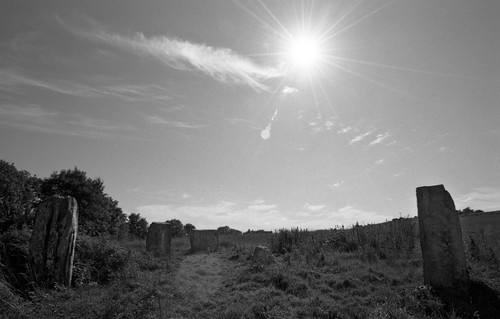
Who knows what went on here? Was it for worship of the Sun or Moon, sacrifices or perhaps some kind of observatory? This is no Stonehenge but impressive enough in its own way. I first came across this stone circle earlier in the Summer when I was driving through Shannonvale. I noticed the stones poking above the hedgerow and decided to stop and have a look. A few days ago I passed again. With the Sun high and bright in the sky, the light was not the best for a photograph (too much shadow and contrast), but then maybe the Sun is what these stones were put here for in the first place.
Since I wrote the above paragraph, I managed to find a link to this place. The small stone you can just about see in the centre is made of quartz and is called the "Sun Stone". In Irish this is "Cloich Griene" which became the "Clon" in Clonakilty (the second part of the name has something to do with woodland so the name Clonakilty means "stone in the trees" or something. Note - If you know any Irish please feel free to correct! I see from the link above that there is a nearby early Christian site with an Ogham stone. I look forward to going to have a look at this sometime - the transformation of these ancient people from worshipping the Sun to worshipping the Son is something I'd love to know more about...
Labels:
18-35D,
Clonakilty,
Delta 100,
Ilford,
Jesus,
Nikon F100,
Stone Circle,
Templebryan
Friday, July 2, 2010
Light in the Darkness
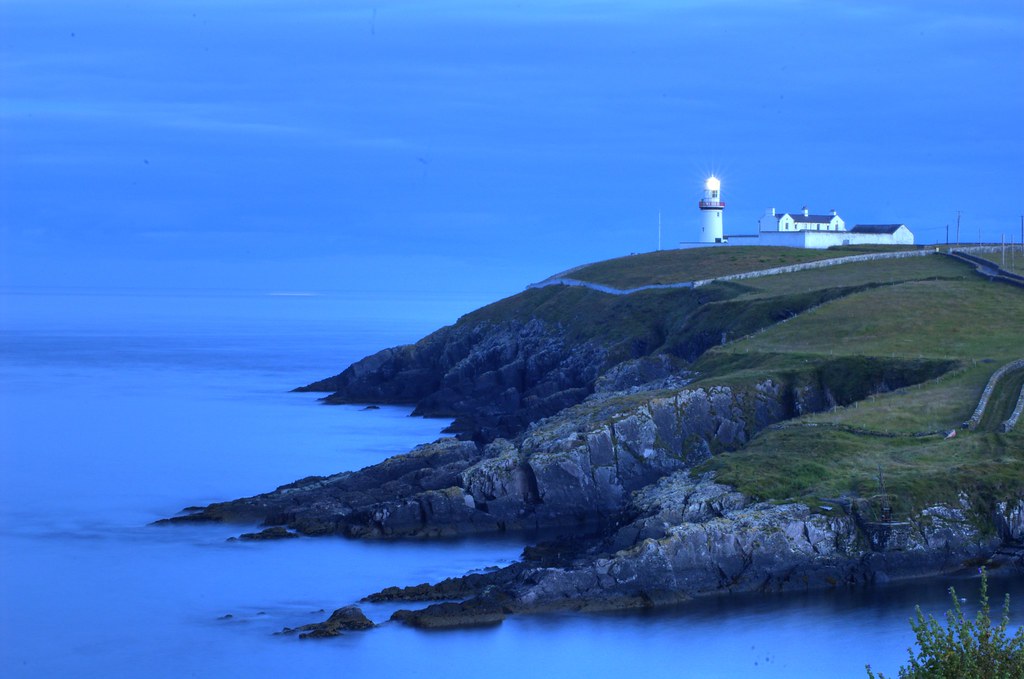
This photo was taken a few nights ago from the road approaching Galley Head Lighthouse. With camera on tripod I kept the shutter open for twenty seconds. In that time the light came around about four times and the movement of the sea has been completely smoothed out so that it looks opaque and misty.
I have always appreciated the metaphor of the lighthouse, there's so much there - the light shining in the darkness, the surety and firmness of the rock in the midst of the unpredictable chaos of the sea, the warning for ships out at sea and the light to guide boats safely into the harbour. Which leads us onto many thoughts; Christ as our rock and the light of the world, the Bible as a lamp to our feet and a light to our path (Psalm 119), the light shining in the darkness as Christ coming into the world (John 1) and so on.
With the Lighthouse long since automated, it is now possible to book accommodation here in the former Lightkeeper's residence, a very nice place to stay I think...
Labels:
Galley Head,
Jesus,
Light House,
Long exposure,
Nikon D70s
Friday, May 28, 2010
Courtmacsherry
Courtmacsherry comes alive during the summer months. It really is a beautiful place and a perfect spot for holidaymakers (if only the sunshine could be guaranteed!)
Whilst I was there yesterday it was pretty quiet, but there is anticipation in the air. The Church of Ireland community are beginning to get the wonderful little church building ready for the summer season and those involved in the tourism industry are hoping and praying that this year will be a good one.
Quite correctly, the people of Courtmacsherry are very proud of their Lifeboat. The Lifeboat Station has been there since 1825 and many lives have been saved over the years between then and now.
Of course there is a clear parallel between the work of the Lifeboat Station and the work of the Church. Both are in the business of saving souls; the Lifeboat crew save people from drowning, Jesus saves us from ourselves and sets us on the rock of salvation...
From Psalm 40:
Whilst I was there yesterday it was pretty quiet, but there is anticipation in the air. The Church of Ireland community are beginning to get the wonderful little church building ready for the summer season and those involved in the tourism industry are hoping and praying that this year will be a good one.
Quite correctly, the people of Courtmacsherry are very proud of their Lifeboat. The Lifeboat Station has been there since 1825 and many lives have been saved over the years between then and now.
Of course there is a clear parallel between the work of the Lifeboat Station and the work of the Church. Both are in the business of saving souls; the Lifeboat crew save people from drowning, Jesus saves us from ourselves and sets us on the rock of salvation...
From Psalm 40:
I waited patiently for the LORD;
he turned to me and heard my cry.
He lifted me out of the slimy pit,
out of the mud and mire;
he set my feet on a rock
and gave me a firm place to stand.
He put a new song in my mouth,
a hymn of praise to our God.
Many will see and fear
and put their trust in the LORD.
Labels:
Courtmacsherry,
Jesus,
Lifeboat,
Nikon D70s,
Psalm 40,
RNLI
Friday, May 21, 2010
In my Father's house...
Olympus OM-1, G.Zuiko 35mm f2.8, Yellow Filter, Ilford FP4 plus, ISO 125
...there are many mansions.
These words of Jesus (from John 14) have ever since they were first spoken, been a source of tremendous hope and encouragement to Christians down through the centuries. No matter what this world and what this life throws at us we know that Jesus has prepared a home in heaven for all those who would seek to follow Him in this life.
I continue to be amazed by this. I know that I am not good enough to be called one of Jesus’ friends and I could write an endless list of reasons why I shouldn’t go to heaven. I have every sympathy with the Apostle Paul when he said:
For I do not understand my own actions. For I do not do what I want, but I do the very thing I hate. (Romans 7:15)
Time and time again we become aware of the battle between what we know is the right thing to do and what we naturally want to do, the battle between “the flesh” and “the spirit”, often portrayed in cartoons as the devil on one shoulder and the angel on the other, each trying to win the mind of the person trapped in the middle!
If the Apostle Paul struggled with this then we are in good company. He goes on to say:
Wretched man that I am! Who will deliver me from this body of death? Thanks be to God through Jesus Christ our Lord! (v24, 25a)
Yes we inhabit “bodies of death” but thank God that we are rescued from them by what Jesus did for us on the cross.
The picture above brought all this to mind. I have passed by many times on my way between Ballinascarthy and Pedlar’s cross. It is a sad sight. Recently I had a bit of time to spare before a home visit so I decided to drop in. There was no one at home although it had been used fairly recently by a chain-smoking tabloid-reading occupant. I could have gone upstairs but I didn’t want to, I felt like I was trespassing. I couldn’t help but feel sad for the person who had lived here last, who had poured so much of their life into this place, in keeping it clean, in decorating, in tending the garden. I thought of the long gone days when the steam train would have been visible on the old railway behind the house; the white puffs of steam and jolly passengers making their way to or from West Cork. I could almost hear the echoes of voices, calling from the kitchen that dinner was ready or the sound of laughter as children played in the garden (if they ever did I don’t know). The tall trees stand like silent spectators all around. If they could, I wonder what story they would tell?
Everything that we take for granted every day is just so temporary, so transient that we would do well and wisely not to cling on to it too tightly. Thank God that our home prepared by Jesus in the next life is a home that is permanent and where ‘moth and rust’ do not destroy and where thieves do not ‘break in and steal’ (Matt.6:19). We do not deserve this home but we have a God who specialises in Grace – undeserved favour.
Wednesday, May 19, 2010
Follow me!
Olympus OM-1, G.Zuiko 35mm f2.8, Ilford FP4 plus, (developed in Ilfosol 3, 6 mins @ 24o)
We had great fun watching this mother duck and her ducklings (all twelve of them) make their way from a stream then across a road and finally into the lake at Fota recently. At the first attempt the mother just hopped out and charged off and then realised that there were no little ones following her. They were left stranded because the bank was too high for them to jump up. So the mother duck had to go back and lead them to a place further down stream where they could climb / hop out. Then they made their procession towards the lake as you see in the picture. I wonder how many of these twelve cute fluffy ducklings will survive to adulthood - I expect they make a fine lunch for several different predators?
Following is not always easy but we have the perfect Leader who looks after us in ways beyond our understanding and will ultimately lead us to our final destination. Of course we can choose to go off on our own way but that is a path where we lead ourselves to certain death. Thankfully Jesus comes looking for us and longs to bring us back into the fold (getting into a knot of mixed metaphors here)! But He will never force us against our will, we have to be willing to follow Him knowing that it really is the only sensible option, but more than that, it is the way to the fullness of life and love and joy and peace and forgiveness...
Thursday, May 6, 2010
Garden Colour Part Two
See how the lilies of the field grow. They do not labour or spin. Yet I tell you that not even Solomon in all his splendour was dressed like one of these.
(Matthew 6:28b, 29)
Well Spring has sprung a bit more since last time. If ever you are thinking about a film for showing off colour (whether it be in your garden, landscapes or even for portraits) may I humbly recommend Fuji's Reala 100. Seeing as only strange people like me use film these days I got twenty rolls of this film off eBay for £20! All these pictures were taken with a Nikon F100 and 28-105 AF-D lens.
Labels:
28-105 D,
Camellia,
Cherry Blossom,
Film,
Fujifilm,
Garden,
Grape Hyacinth,
Jesus,
Nikon F100,
Reala 100,
Solomon,
Spring,
Tulips,
Worry
Sunday, April 25, 2010
Leaving a mark
Olympus OM-1, G.Zuiko 35mm, Ilford HP5 plus @ 400 ISO
Two small boys and a muddy flower bed = hand prints on the side of the house!
We all leave a mark of some kind. Perhaps in the context of history, the mark that we leave is about as permanent as these muddy hand prints, soon washed away and forgotten about. Perhaps our names will be looked up and placed in a family tree by our distant descendants. In the corridors of eternity our presence must be no more than a transitory echo, the whole sum of our existence and efforts no more permanent than the blinking of an eye.
And yet
We do matter and we do have a permanent and real and significant place not only here and now, but always. These are some words of Jesus (speaking about His followers) from this mornings Gospel:
I give them eternal life, and they shall never perish; no one can snatch them out of my hand.(John 10:28)
Death is more of a beginning than it is an ending and as our Psalm reminds us this morning (Psalm 23), He is there with us not only in life, but in death too:
Even though I walk through the valley of the shadow of death, I will fear no evil, for you are with me, your rod and your staff, they comfort me.(Psalm 23:4)
Labels:
35mm,
Black and White,
hand prints,
HP5 plus,
Ilford,
Jesus,
Mud,
Olympus OM-1,
Zuiko
Sunday, April 18, 2010
Peter and Jesus
Photo notes: This is a picture from about three years ago. Much as I would like to have a picture of the shores of the Sea of Galilee, this is the next best thing, the north shore of Great Island! The funny cartoonish effect (especially noticeable in the clouds and the trees) is HDR, the effect you get from combing three different exposures of the same scene into one. This was achieved using a trial version of Photomatix.
Today's Sermon: John 21:1-19
Have you ever let Jesus down? If you have you will know how crushing the disappointment can be. But Jesus is not like anyone else - He doesn’t go off in a huff, He wants us back and living with Him and for Him once again.
You may remember from last week that the Lord Jesus had appeared to the disciples previously, when they were all huddled together in a locked room. You may remember ‘doubting Thomas’ seeing the risen Lord for himself, seeing the scars in Jesus’ hands left by the nails and the scar in his side left by the spear and how he exclaimed “My Lord and my God”. Well if last week it was about Thomas’ encounter with Jesus then this week it is about Peter’s encounter.
Peter had a very heavy heart. He had denied his Lord and master three times. He felt very bad about it, he was crushingly disappointed with himself. Seeing Jesus again in that locked room brought him joy but it also brought him pain. Just when his Friend needed him most, he three times denied to complete strangers that He even knew Jesus.
Peter is hanging out with Thomas, Nathanael, the brothers James and John and two other disciples. Peter wants to go fishing. Perhaps returning to what he did before he met Jesus will help him in some way. His friends say that they will go with him so, as the day is coming to a close they set out in a boat onto the sea of Galilee.
It is a fruitless night, they catch nothing. The fish are having none of it! Early in the morning, as the darkness is lifting a little and the sun is thinking about poking its head over the horizon, Peter and the others see a man standing on the shore. There is not enough light yet to see who it might be. The man calls out to them saying
“Children, you have no fish, have you?”
They still don’t recognise the man or His voice.
“No”, they answer.
The man says:
“Cast the net to the right side of the boat, and you will find some”
Maybe at this point they are getting an inkling as to who this man might be. A few years before something similar happened when Peter received his call from Jesus. On that day he put his net into the water and was overwhelmed by the number of fish, but even more overwhelmed by this carpenter from Nazareth, to whom he had said “Go away from me Lord for I am a sinful man” (Luke 5:8). But Jesus replied to him on that day “Don’t be afraid, from now on you will catch people” (Luke 5:10). That day, Peter had left his boat and hits nets and everything to follow Jesus.
Now here we were again. Déjà vu. They put the net over the right side of the boat just as the man said and what do you know, yes, they were unable to haul the net in because of the large number of fish!
John looked at Peter and said “It is the Lord!” Peter doesn’t hesitate, he loves Jesus, He loves Jesus with all his heart, he is so sorry for ever letting Him down, he so wants to see Him again, to talk to Him so that Jesus knows he is sorry. Peter quickly puts on his clothes and jumps into the water. Peter swims the hundred yards or so to the shore with the others coming behind him in the boat. By the time the others arrive towing the bulging net of fish behind them, Peter is ashore with Jesus and a fire has been lit. Jesus already has some fish cooking and some bread and He calls out to them to bring some of the fish that they have just caught. Peter jumps aboard and helps pull the overflowing net ashore. John tells us that there were 153 large fish and is surprised that the net is not even torn. Jesus calls them to come and have breakfast. They all know that it is the Lord but they are afraid to ask. Having breakfast on the beach with someone who has risen from the dead is not an everyday experience.
Once they finish breakfast Jesus speaks to Peter and says:
“Simon son of John, do you love me more than these?” Peter has desperately wanted this moment, this chance to try and restore his relationship with Jesus, but he is understandably also a little afraid. He replies
“Yes Lord; you know that I love you.”
Now the word ‘love’ in the Greek has subtle differences. The word Jesus uses for love is agape which means a complete love that is even prepared to sacrifice oneself on behalf of the person you love, (for example Jesus’ love for us by sacrificing himself on a cross, or a parents love for their child). Jesus asks Peter do you love me sacrificially, are you prepared to give up everything even your life to follow me?
Peter replies “Yes Lord you know that I love you”. Peter knows that he has made great claims before about following Jesus. He had said to Him "Even if I have to die with you, I will never disown you." (Mark 14:31). Now he says it from the heart and as best as he can “Yes Lord you know that I love you”. But Peter does not say that he loves Jesus with agape sacrificial love, the word that he uses is phileo. This is still love, but it is more an affectionate brotherly love.
Jesus says to Peter, “Feed my lambs”. Peter is to look after Jesus’ followers and to take care of them when He has gone. Then Jesus says to Peter more directly;
“Simon, son of John, do you love me?”
Again Jesus uses the word agape for love. Does Peter love Jesus fully and sacrificially. Perhaps he does but he is not yet ready to openly admit it, perhaps for fear of letting Jesus down again. He replies:
“Yes, Lord; you know that I love you.”
Again Peter uses the affectionate Phileo word for love. Again Jesus says to him “Tend my sheep”.
Three times Peter denied Jesus, now to help restore their relationship Jesus asks Peter for the third time:
“Simon, son of John, do you love me?” Jesus no longer uses the agape word for love, He uses Phileo. In effect He is saying: “Peter, Peter are you even my friend?” Perhaps Peter is not quite ready to trust himself again after letting his Master and friend down so heavily before. Peter is hurt and upset and perhaps doesn’t yet understand why Jesus is talking to him like this. Peter can still only reply using the Phileo, brotherly love word as he replies for the third time saying:
“Lord, you know everything; you know that I love you.”
What a change has taken place in Peter. This was a man who was full of life and energy and ultra-enthusiastic. The sort of person who charged into everything, often without thinking first. There was no keener follower of Jesus and yet when it came to the crunch, when he was asked publicly whether or not he was a follower of Jesus he had sworn that he was not (Matt. 26:72). Peter was completely devastated by his behaviour. He had wept bitterly (Matt. 26:75) it was perhaps the saddest moment of his life. And now here Jesus had asked him three times whether he loved Him or not, once for each of the time that he had denied Jesus. Peter is able to reply that yes he does love Jesus, but not as strongly as Jesus would like. Peter is now perhaps being over cautious.
But Jesus knows Peter’s heart. For the third time He says to him: “Feed my sheep”. Jesus knows that Peter does love Him, He knows that Peter will be a key leader in the Church. He knows that Peter and the others will be given all the courage and strength that they need when the Spirit would come in power upon them on the day of Pentecost.
Jesus knows the future. He knows that Peter will love Him so much that, in the end he would give his life willingly and unquestioningly for Jesus. (Legend tells us that Peter was crucified upside-down because he refused to killed in the same way that his master had. Even at Peter’s death he was thinking about his Master’s glory.)
And what about us? Perhaps we can think of a time or times that we have let Jesus down, perhaps we have been ashamed or embarrassed to admit that we know Him as our Lord and Saviour. Perhaps we worry that people will think we are a bit odd for doing so. Yes if we deny Jesus we should be devastated for doing so - but that is not the end, like Peter, we can be restored and reconciled with Jesus, we only have to be willing to give Him our love and He will do the rest.
To Peter Jesus said “Follow me”. He says the same today to you and to me: Come, Follow me... Amen.
Labels:
agape,
forgiveness,
Great Island,
HDR,
Jesus,
Peter,
Phileo,
restoration
Sunday, April 4, 2010
Something about that foot
Detail from Stained Glass in the Church of the Ascension, Timoleague, Co. Cork
Nikon D70s, f4, 1/30 sec, ISO 200, 75mm equivalent
There's something about that foot. It was one of my first Sundays in Timoleague when I saw it. The image seemed to jump out at me. I even remember waking in the early hours of one morning with this image burning in my mind. It's the wound of course. It is compelling, it says so much, it is so deep so clinically cut, so painful looking. This is the bit that get's me - it is my fault. It is my fault that Christ had to be given those horrible wounds, more than that, that He willingly allowed those wounds in order to take the punishment that I deserve. Such incredible love and amazing grace, what a Sacrifice, what a Saviour.
Happy Easter.
Happy Easter.
Labels:
Christ,
Easter,
Jesus,
Lord,
Nikon D70s,
Resurrection,
Saviour,
Timoleague
Friday, March 19, 2010
A Precious Perfume
Note: I don't have any pictures of Spikenard, so this Lavender photo that I took at the Eden Project a few years ago (that I have Ortonized in Photoshop Elements) will have to do ;~)
What is the most precious object that you own? How special is it to you? Would you be prepared to give it away in order to say 'thank you' to Jesus? That's a tough one isn't it! Not long after we were married, my wife and I were given a car by some friends of ours - it was a fairly old car though it was in good condition. It was an amazing act of undeserved favour - our friends had very little money and they wanted to give something that not only would be of great help to us but would be a way of saying 'thank you' to God for the many ways in which he had blessed them. To this day, that couple and their children are amongst the happiest people we know. It's a principle that I see time and time again, that the happiest people are also the most generous people and of course the reverse is true also, the more we try and hold on to things for ourselves the less happy we will be.
In today's reading from John's Gospel, the Lord Jesus is welcomed as Guest of honour at the home of Lazarus, Mary and Martha. We know Mary and Martha from the time when Jesus went to their house before and Martha was rushing around preparing food and tidying whilst Mary sat at Jesus' feet and listened to what he had to say. Of course we remember too the story of Lazarus, where Jesus raised him from the dead after he had been in the tomb for four days.
So they have this special dinner for Jesus and there are a number of other guests there also. True to form, it is the busy Martha that serves them and John tells us casually that Lazarus was one of those sat around the table with Jesus. It's funny how relaxed it all is, here is a man who was dead and in his tomb and yet now he is alive again. He is not a ghost or some kind of apparition, he is able to sit down and walk around and breathe and talk and eat! Lazarus is a walking talking miracle!
Mary, Martha and Lazarus love Jesus. People express their love for Jesus in different ways. The way that Mary expresses her love is very special and beautiful. She expresses her love and gratitude to Jesus using a pound (that is nearly half a kilogram) of perfume made of pure nard. Now Nard (or Spikenard as it is sometimes called) is no ordinary perfume. It is a flowering plant of the Valerian family that grows in the Himalayas of China, India and Nepal. The plant grows to about 1 metre in height and has pink, bell-shaped flowers. It has rhizomes (underground stems), which can be crushed and distilled into an intensely aromatic amber-colored essential oil, which is very thick in consistency (from Wikipedia). So imagine in those days getting a perfume from the Himalayas overland on camel-back thorough countless mountain passes some 3,500 miles to Israel! No wonder it was a very expensive and very precious perfume.
In those days the men would have eaten separately from the women and they would have been inclined on couches around a low table. Mary is probably standing as an attendant, she comes from behind Jesus and breaking open an alabaster jar pours this very precious oil over him and especially on his feet. She then unties her hair and wipes Jesus’ feet. There is such an abundance of oil that it has to be dried up!
This is a truly wonderful act of worship. Mary doesn’t care about what the other guests might think as she pours out her heart and her soul and her most expensive possession as an act of worship. It is wonderful when we can do that too, when we can worship Jesus with every ounce of our being and not let any inhibitions get in the way.
The moment of transcendence is broken by the voice of Judas who says:
“Why was the perfume not sold for three hundred denarii and the money given to the poor?” (v.5)
A legitimate question perhaps. This was after all very expensive perfume. I did a bit of maths. A Denarius was the amount a laborer was given for a days work. So the minimum wage today is €8.65 an hour so say at 37 hours a week and with six weeks unpaid holiday a year that is roughly €14,000 in today’s money. That was one very expensive jar of perfume and one very extravagant act of worship! To Judas this looks like unjustifiable extravagance. He gives the impression that he cares for the poor but John sadly tells us that he was, in fact a thief.
So Mary is now surrounded by disapproval, Mark tells us in his account that others joined in Judas’ indignance. Yet amid all those stern faces and mocking tones there is One face and One voice which approves of what Mary has done - and it is the only voice which matters, that of the Lord Himself. Jesus knows why Mary did this incredible thing, he says:
“Leave her alone. She bought it so that she might keep it for the day of my burial. You always have the poor with you, but you do not always have me.” (v.8)
Mary knew what she was doing. She knew that there were many who wanted to kill Jesus, many who were jealous of Him. She knew that it was only a matter of time before He was killed by His enemies – had He not said so Himself numerous times? She had bought this jar to anoint Jesus’ body for burial. This might be her last chance to do so, her last opportunity; she might not be able to get this close to him again. Mary knows that she owes so much to Jesus; she owes him her salvation and the recovery of her brother Lazarus from the dead. Her whole life has been utterly transformed by Jesus, the pouring out of fragrant perfume was both a natural and from the heart act of devotion and worship. Having freely received, she freely gave.
Jesus makes it clear that His time is coming to an end. The poor will always be with them, He would not. Just now, at this moment, anointing Him for burial was the more important thing to do. The responsibility and privilege of caring for the poor would be for the church through the ages. Matthew and Mark in their accounts of this story add Jesus’ beautiful promise:
“I tell you the truth, wherever this gospel is preached throughout the world, what she has done will also be told, in memory of her.” (Matthew 26:13)
There is an unfortunate contrast between Judas and Mary. It is natural for the reader or listener of the story to ask themselves the question as to which character most represents them. Unless we can appreciate what Christ has done for us we can have no sense of the level of debt that we owe Him. Even if we were the able to give the whole world and all its riches it would not be sufficient to pay the debt we owe. When the penny drops, when we finally realize, then we will hold back nothing from the One who gave His everything, even His life for us upon the cross.
So as we consider our possessions and the most precious things that we own, suddenly they don’t seem so valuable any more. How can we not love Jesus? How can we not feel as Mary did when we know that our sins are forgiven, when we know that we have peace with God when we know that we shall be with Him in heaven for eternity?!
Let us pray that our faith will not be like that of Judas, a mere temporary impression, like the morning cloud and early dew which lasts only for a season. Let us pray that our faith will be like that of Mary: real, true, genuine and sincere, a faith free to express itself, not caring what others will say or think, a faith that is the result of accepting God’s love, God’s grace, and a faith that is the result of a living relationship with our Lord, Saviour, Master and Friend, Jesus Christ, Amen.
--------------------------------
See also:
J.C. Ryle, “Expository Thoughts on the Gospels”, John Volume II, James Clarke & Co. 1969.
William Hendriksen, New Testament Commentary, John, Banner of Truth Press, 1998
Friday, February 26, 2010
Focus
Nikon F100, Nikkor 28-105 f3.5-4.5 D, Ilford HP5 plus (ISO 400), (click to enlarge)
I came across these words by Max Lucado recently in his book "The Great House of God":
Some years ago a sociologist accompanied a group of mountain climbers on an expedition. Among other things, he noticed a distinct correlation betwen clound cover and contentment. When there was no cloud cover and the peak was in view, the climbers were energetic and cooperative. When the grey clouds eclipsed the view of the mountaintop, though, the climbers were sullen and selfish.
The same thing happens to us. As long as our eyes are on his [that is God's] majesty there is a bounce in our step. But let our eyes focus on the dirt beneath us and we will grumble about every rock and crevice we have to cross.
These very helpful words brings to mind one of great verses of encouragement, Hebrews 12:2
Let us fix our eyes on Jesus, the author and perfecter of our faith, who for the joy set before him endured the cross, scorning its shame, and sat down at the right hand of the throne of God.
Fixing (or focusing) our eyes on Jesus, that's what it's all about - if only I didn't get in the way so much...
Labels:
28-105 D,
Barbed wire,
Focus,
HP5 plus,
Ilford,
Jesus,
Max Lucado,
Nikkor,
Nikon F100
Sunday, February 21, 2010
Let me see thy footmarks, and in them plant my own.
The title of this post is from the first lines of the last verse of that great hymn of commitment "O Jesus I have promised." The verse goes:
Oh, let me see Thy footmarks,We sung it in church yesterday and it went very well as an accompanyment to the reading (Jesus' temptation in the wilderness from Luke 4). I love the powerful imagery of looking for the Lord's footprints and putting my own inside them. I remember as a child trying to put my feet into my father's footprints in the sand at the seashore. The strides were just too big and so each one was an enourmous leap. Eventually though as one grows up it becomes easier to follow.
And in them plant mine own;
My hope to follow duly
Is in Thy strength alone.
Oh, guide me, call me, draw me,
Uphold me to the end;
And then to rest receive me,
My Saviour and my Friend.
Same with following Jesus I suppose, sometimes the strides needed seem impossibly large, but then with time (and of course His help) it becomes less difficult.
Sunday, January 31, 2010
Waiting for Salvation
Sermon for Today. Luke 2:22-40.
What’s the longest you’ve ever had to wait for something? Maybe we have waited a long time in a queue to buy something we really wanted, maybe we have waited a long time to receive a letter, perhaps with good news in it. Maybe we were sick and we had to wait a long time to get better. Maybe we had to wait a long time for someone to return who had gone away. Life is full of waiting and some of us are better at it than others. In today’s reading from Luke chapter 2 we come across the joy of a man and a woman who had waited their whole lives for something and now finally in their old age it had happened.
Joseph and Mary were bringing the baby Jesus to the temple in Jerusalem. In Jewish life there were three ceremonies that occurred after a child was born. If it was a boy the first of these was circumcision, which happened on the eighth day after birth. This act symbolised the Jews’ separation from Gentiles and their unique relationship with God, it was a time of joy when friends and family members celebrated the baby’s becoming part of God’s covenant nation, (not unlike our baptism of infants in the church today). The second ceremony was the “Redemption of the firstborn”. A firstborn son was presented to God one month after birth. The ceremony included buying back or redeeming the child from God through an offering. The point of this was for the parents to acknowledge that the child belonged to God, who alone has the power to give life. The third ceremony was the "Purification of the mother". For forty days after the birth of a son and eighty days after the birth of a daughter, the mother was ceremonially unclean and could not enter the temple. At the end of this time, the parents were to bring a lamb for a burnt offering and a dove or a pigeon for a sin offering. The priest would sacrifice these animals and declare the mother to be clean. If a lamb was too expensive, the parents could bring a second dove or pigeon instead. This is what Mary and Joseph did.
So there are Mary and Joseph, with Jesus at the Temple, for Mary’s purification, when they come across an old man called Simeon. Simeon had been waiting for many years for this day. God had made a promise to Simeon that he would not die before he had seen Christ, the Messiah, the Saviour. Simeon was now old, but he had never lost hope. He had nurtured a vision for years, perhaps wondering at times if it was just a dream or wishful thinking. Then one day, he lifts up his eyes in the Temple, he sees a young couple with a baby, and no longer doubts, but knows in his heart that what God said would happen is indeed happening.
Luke tells us that Simeon is both righteous and devout. He is a good man, he lives his life is such a way as would be a good example to all and he is totally committed to God in his heart, mind, soul and strength.
We are told that Simeon was waiting for “the consolation of Israel” (v.25), a strange phrase, what does it mean? In the Message translation, this phrase reads that Simeon was a man who “lived in the prayerful expectancy of help for Israel”. Things were really not that great for the people of Israel at this time. Thanks to the Romans, they had lost their political independence, (though King Herod was still allowed to reign over them in cruelty). Thanks to the scribes and the Pharisees, the Jewish religion had become more about outward show and religious ritual than an internal change of heart. Yet there were godly men and women like Simeon, Anna and many more who were eagerly waiting for God to come and rescue them. Simeon knew that time had come as soon as he saw Jesus.
Simeon takes the child Jesus in his arms and utters his timeless words, inspired by the Holy Spirit and known to many as the Nunc Dimittis (the first words of the Latin translation):
‘Master, now you are dismissing your servant in peace,
according to your word;
for my eyes have seen your salvation,
which you have prepared in the presence of all peoples,
a light for revelation to the Gentiles
and for glory to your people Israel.’
Simeon’s heart is flooded with thanksgiving and praise. He thanks God for what this child means to him personally and for what it means for all people, both Jew and for Gentile. As far as Simeon is concerned, he is ready to die because that which he has longed for for many years has come to pass. The saviour is here and he has seen and held Salvation in his arms!
Simeon declares that Jesus is a “Light for revelation to the Gentiles”. Now to those who had no knowledge of God, who were living in darkness, the Light of Salvation has come. Jesus also brings “glory” to Israel because they above all nations were the ones chosen by God for the purpose of spreading the true religion among the nations of the world and selected to be the people among whom the Christ would be born.
What Simeon said about Jesus amazed Joseph and Mary. Of course the angel Gabriel and the Shepherds had previously said wonderful things about this child, but these earlier messages did not include anything so specific about the significance of this child for both Gentiles and Israel.
Simeon then prays a prayer of blessing over Mary and Joseph and says something to Mary that must not have been too easy for them to hear:
‘This child is destined for the falling and the rising of many in Israel, and to be a sign that will be opposed so that the inner thoughts of many will be revealed—and a sword will pierce your own soul too.’
When people encountered Jesus, there would be no sitting on the fence. He would be the great divider, as William Hendriksen puts it, “a person’s relation or attitude towards Jesus would be absolutely decisive of his eternal destiny.”(William Hendriksen, The Gospel of Luke, Banner of Truth Trust, 1978, p.170)
Where we will exist in eternity is 100% determined by our attitude towards Jesus, he is after all the way, the truth and the life, and no one can come to the Father except by Him (John 14).
I’m sure that Mary in particular would have come back to Simeon’s words many times over the course of her life. In the moment of her deepest agony, when Jesus hung on the cross these words would have provided a measure of comfort that in fact God was in control and it was indeed part of His great plan for the Salvation of all who would come to Him in repentance and faith. Of course, upon Jesus’ resurrection these words would have led to an even greater strengthening of Mary’s faith as her heart was filled with joy and worship.
Our reading concludes with a short piece about Anna, an elderly widow and prophet. She had practically lived at the temple for many years, fasting and praying night and day. Like Simeon she had waited and waited and waited for God to do something. She had not given up hope, she had prayed and fasted and then one day she saw the answer to her prayer and suddenly her heart was filled with praise. Imagine her joy as she watches the scene with Simeon holding Jesus aloft and uttering those famous words. Anna is filled with gratitude to God and she cannot help talking about it.
Simeon and Anna and many others had to wait a long time for Jesus to come. When He did come they recognised Him immediately and their lives were never the same again. The good news is that we don’t have to wait, Jesus is alive and through the presence of the Holy Spirit He is here with us now. Like Anna, like Simeon it is important that we recognise Him, that we worship Him and that we acknowledge Him as our Lord and our Saviour, our master and our God. One of the names by which Jesus is known in the Bible is Emmanuel, which means 'God with us'. We do not have a far away remote god, we have a God who is intimately present at every moment, who understands and knows us, who ‘perceives our thoughts from afar’ and who ‘knit us together in our mothers womb’ (Psalm 139).
Do you know Jesus? Is He the most important Person in your life? Do you acknowledge Him as your Lord and your Saviour? Now is not the time for waiting, now is the time for receiving Him. Amen.
Subscribe to:
Posts (Atom)

